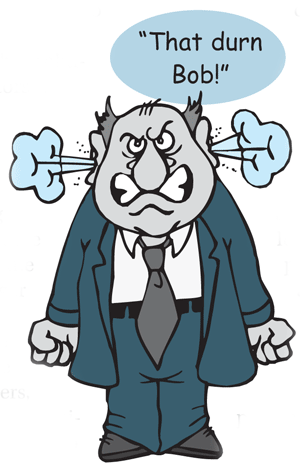The economy is wrecked. People are mad. Who’s to blame for the mess we’re in?
 Some prominent journalists and politicians have decided the culprits are those damn public employees. You know the ones—teachers and municipal workers who have the gall to expect a modest pension when they retire.
Some prominent journalists and politicians have decided the culprits are those damn public employees. You know the ones—teachers and municipal workers who have the gall to expect a modest pension when they retire.
Here’s the viewpoint we’re all supposed to embrace: the nation’s economic crisis isn’t the fault of bankers or derivative traders or deluded federal regulators. No, it’s Bob’s fault.
You know Bob. He’s the guy who teaches your fifth-grade kid, drives the bus you take to work, responds in a hurry when you dial 9-1-1, and tends to your needs if you end up in the hospital. That Bob, he’s a real problem. He has a pension waiting for him when he retires, that greedy SOB.
Shall we just string him up now? Or should we pause a moment to look at the facts?
Among the 492,000 retired government workers receiving checks from California’s Public Employees’ Retirement System, the average monthly benefit is $2,188.
Hmm, not exactly a fortune, but it still might make you a little jealous if you’re one of those people who is facing retirement with no pension at all.
And there’s a lot of pension-less workers these days. Among all workers, the percentage covered by pensions has fallen by half over the last 30 years, to just 20%.
Of course there’s been an increase in the number of workers covered by 401(k) and other “defined-contribution” plans. But this switch to 401(k) plans has left workers worse off.
A recent study by the Social Security Administration found that the increase in income from defined-contribution accounts—like the 401(k)—doesn’t keep up with the decline in old-style defined-benefit benefits. The move to 401(k) plans is a net loser for workers.
But people with 401(k) plans are not at the bottom of the heap. No, that position is reserved for the estimated 43% of California workers employed in jobs that offer no retirement benefits at all.
Many politicians and bloggers and editorial writers have decided it’s very important to whip these pension-less workers into a lather about those public sector workers who will receive a modest monthly check after they retire. Why is it important to get one group of workers mad at the other? Because otherwise those pension-less workers might direct their anger in a more productive direction.
So here’s how we’re supposed to think about the current economy:
Why are 15 million people out of work? Gee, it must be those public employee pensions.
Why are nearly one-quarter of all US residential mortgages “under water”, where 11 million home-owners owe more on their mortgages than their home is worth? Those darn public employee pensions must have something to do with it!
Why are banks sitting on trillions rather than investing in economic growth, while bank executives continue to rake in their fat bonuses? It’s Bob, he’s to blame.
Put that way, doesn’t it seem just a little nuts to focus so much anger on public employees who are just doing their job and want a small nest egg to help them survive in retirement?
Yes, it’s nuts. But the politicians and commentators who attack public employees know what they are doing. It’s a two-fer: you get to demonize “big labor” and “big government” at the same time. The idea is to get the public to focus their anger on labels, and to forget the ordinary people behind the labels: the city maintenance workers, the electrical workers, the sanitation workers, the people who hold our communities together.
As Amy Traub noted in The Nation, these tactics deflect attention from the real culprits: irresponsible Wall Street traders, whose risky, high-profit business practices brought down the economy, and the lax regulators who let them get away with it.
Defining the Debate
It’s all about defining the debate. What are we going to talk about? The public sector workers who in some cases may have a little more than private sector workers? Or are we going to talk about the long, pernicious erosion of pay and benefits for working people across the board? Are we going to focus on dragging public sector workers down and shredding their pensions? Or should we resolve right now to redefine the debate so that we can talk about the people who are really plundering our economy?
Those who are leading the charge on public sector workers are going for the jugular vein of middle class America, you can count on that. Questioning the value of public sector workers is just an opening wedge in a much larger project: challenging the very idea of public goods and services, and ultimately causing people to question the legitimacy of government itself.
If you succeed in making people believe that government is the enemy, you are well on your way to blocking government from reforming the banks, regulating Wall Street speculators, and reining in executives who pay themselves big bucks for driving their companies into the ground. When government is the enemy, it’s easier for city leaders to privatize city services and turn over an ever-larger share of the public’s wealth to unaccountable private companies. And when government is the enemy, it’s easier to block public investments that create public sector jobs—the jobs that keep our municipal services going.
It makes the whole ugly political mess so much easier to digest. We can just blame Bob.